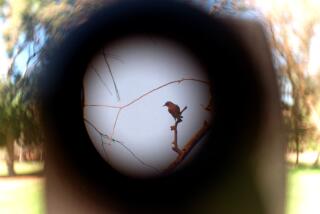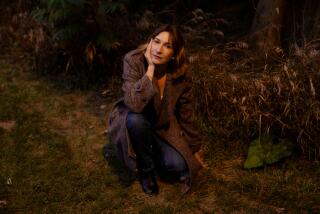‘Outside of a Dog: A Bibliomemoir’
Outside of a Dog
A Bibliomemoir
Rick Gekoski
Constable & Robinson: 278 pp., $23.95
At last, a book about a life with books that puts the little buggers in their place. After his divorce, Rick Gekoski spent a few weeks wondering who he was without his books (the ex held them for ransom). They were, he thought, “as close as I came to a soul.” In a flash (epiphany-like), he realized that he didn’t actually need to have them with him at all times to recognize their importance in his life.
In this delightful memoir, Gekoski tells how his favorite books lived alongside him in various phases. “Horton Hatches the Egg” by Dr. Seuss was a childhood favorite; J.D. Salinger and Allen Ginsberg accompanied Gekoski through high school, training his inner eye to spot the phonies and recognize the cold absence of truth. T.S. Eliot and D.H. Lawrence proved useful in the love department; R.D. Laing and Germaine Greer, on paper and in person, helped shape the young adult. What’s different here is that Gekoski doesn’t go gooey about books -- there’s no hagiography, just companionship and some good advice. “Literature didn’t help me,” he realized when his mother died. It did, however, sharpen his compass (not necessarily the moral one, but the sense-of-self compass).
Gekoski studied literature at Oxford (Merton College). He caught himself foundering in a “miasma of mock Englishness,” slogging through a DPhil on Joseph Conrad and facing the “pressure to regard reading and writing as forms of work.” Same thing with teaching: Gekoski split off from academia to become a rare book dealer: “Colleagues would occasionally inquire, sniffily, ‘And how is business?’ My regular response to this -- ‘Terrific! And how are you finding academic life?’ -- generally signaled an end to the conversation.”
He wrote a novel, “Staying Up,” and that was fun. Books led Gekoski to his insider/outsider life -- an effervescent witness to literature. “Outside of a dog,” he quotes Groucho Marx in his frontispiece, “a book is man’s best friend. Inside of a dog, it’s too dark to read.”
Things Seen
Annie Ernaux
Translated from the French by Jonathan Kaplansky
Bison Books: 106 pp., $16.95 paper
Annie Ernaux was blogging about her daily life long before the blog was invented. If anyone can raise it to an art form, she can. Widely read in this country in the late 1980s -- “A Man’s Place” (1984) and “A Woman’s Story” (1984) were New York Times bestsellers -- she used a vivid, reportorial style to write from the front lines of the 1960s and the gender wars.
The pieces in “Things Seen” are from another battlefront: daily life in 1990s France, interrupted by poverty, news reports and bomb threats in the Metro. Ernaux captures faces and scenes in a fleeting, ghostly way. Her observations are intended as evidence, many of them made on the train/bus system in and around Paris. This is a beautiful translation -- Ernaux, poorly translated, seems heavy and difficult. “Things Seen” is light; it asks little of readers. Things blur by -- war, petty theft, small acts of terrorism. There’s nothing you can do.
Solar Poems
Homero Aridjis
Translated from the Spanish by George McWhirter
City Lights Books: 262 pp., $17.95
The poet goes wandering between worlds -- big rubble, palm trees, temples, monoliths, lost Zulu kings. Homero Aridjis seems a little lost, like a man waking in a strange house, “in the darkness of my own self, / not knowing if she were the real person and I, the / ghost,” he writes in “Meeting My Mother in the Old Kitchen.” He is philosophical -- where do we fit in this world: “Does the solar eye dream of the Earth / sear everything with its senses / or do we dream the eye that sears us / dreams us?” A painter and the poet discuss the sun: “From seeing it so much my eyes have grown solar, / from so much naming of it my words glow, / said the poet.” This is the voice of an older poet; someone who has fought for things: “The labor of dreaming solo was / to harrow the walls and furrow the sea. I cut the traces and I broke free. . . .”
Salter Reynolds is a writer living in Los Angeles.
More to Read
The biggest entertainment stories
Get our big stories about Hollywood, film, television, music, arts, culture and more right in your inbox as soon as they publish.
You may occasionally receive promotional content from the Los Angeles Times.






